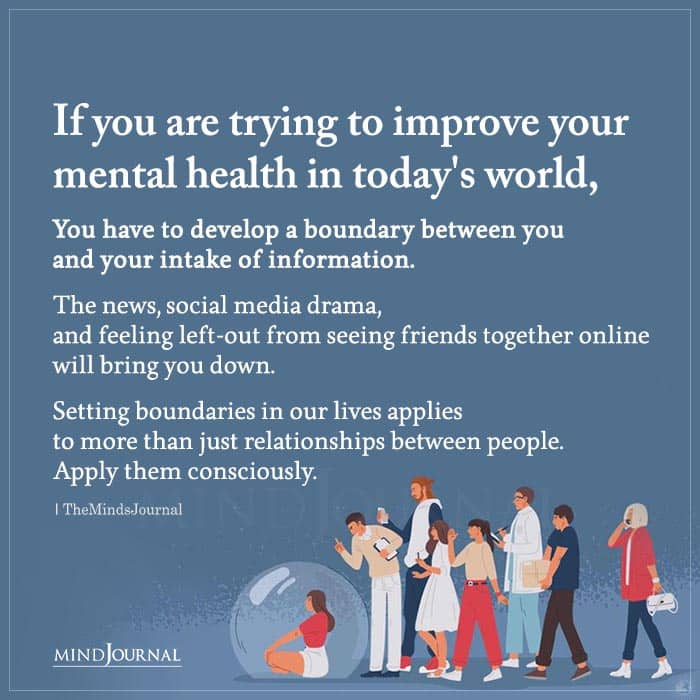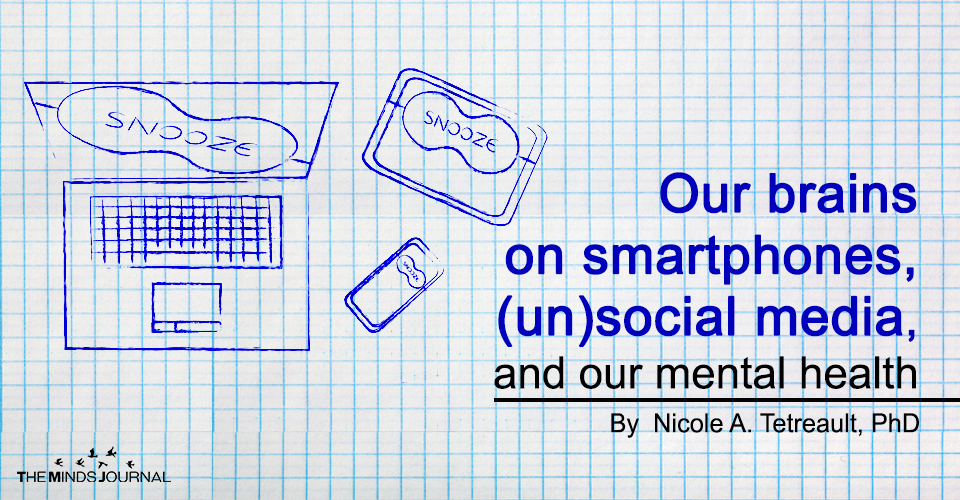Our Brains on Smartphones and (Un)social media: Here’s how does social media affect mental health according to science.
The Chainsmokers’ latest song, Sick Boy, sums it up in a line, How many likes is my life worth? Constant interruption, desire to be entertained twenty-four-seven and continued connectedness are taking a toll on our mental, physical, and emotional health.
Smartphones are not making us smart
There is now a wide body of evidence that points to the fact that heavy use of smartphones, the internet, and many social media platforms can have debilitating effects on our neural processing, cognitive performance, and behavior.
On average smartphone users check their phones close to 85 times a day and interact with their phone about five hours a day. Increasing evidence is pointing to the fact that our smartphones are not making us so smart after all and are leading us to more unhappiness.
Read How Did Facebook Go From Fun to Being a Toxic Place to Socialize!
Recently, Sean Parker, one of the developers of Facebook, admitted they designed the program to monopolize our time and attention as much as possible. Specifically exploiting the principles of psychology, Facebook triggers the social validation loop and activates insecurity, where people are searching for continued validation and reward.
When this happens, we fall into a pattern of the hedonic reward cycle, pleasure-seeking, for social validation. Much like Pavlov’s dogs salivating at the sound of the dinner bell, we are conditioned to check our phone for our satiety of social approval, wondering if we got enough “likes.”
A novel study by Adrain F. Ward and colleagues found that the mere presence of a smartphone induces a “brain drain,” a disruption that limits one’s ability to participate in the present moment. This reduces the cognitive capacity for the task at hand by increasing an attentional shift toward the smartphone. This process is exhausting, and that is exactly how our brain feels as it wastes energy.
So, when you are at a lunch date, dinner, business meeting, or engaged in a conversation, have your phone out of sight so you can focus on the present moment. Engage your attention in a single task, paying attention to the person right in front of you.
Social media affect mental health
Not only do smartphones hog our attention but they impair our learning and memory. Interestingly, a study found that too much media multitasking causes cognitive overload, which interferes with learning.
Heavy multimedia users were more distracted and did not perform attentional tasks as well compared to light multimedia users. Unfortunately, more often than not, the loudest thing gets our attention. Our smartphones can create infinite distractions that can alter our cognition, behavior, and performance.
Read Internet Addiction: How Does It Affect Your Mind And Body?
Heavy smartphone users experience greater impulsivity, hyperactivity, and negative social concern, as reported in a study conducted by Aviad Hadar and colleagues. Additionally, heavy smartphone users showed greater difficulty with number processing and reported greater inattention. This could explain why many of us feel depleted and have difficulty remaining on task.
Unfortunately, people who use many social media platforms feel increased anxiety and depression. And a new study found that 75% of people do not want to see their “friend’s” vacation photos on social media.
So, what is happening?
Connectedness and being social is getting lost in translation. We have entered the new divine age of keeping up with The Jetsons. Basically, following friends on social media created increased envy, depression, and negative mood in college students.
When social validation does not happen, or we are rejected on social media, our brain hurts, we experience emotional pain, and this affects our mental health and well-being. Overuse of smartphones and many social media platforms have major consequences for health, life satisfaction, meaning, and happiness.
Is all social media and the things we do on our smartphones bad?
No. It’s the balance when using our devices and how we interact with them. A smartphone, the internet, or social media can all lead to negative consequences. It is our responsibility to use and interact with them wisely.
If we condition our mind and behavior toward constant validation through social media and smartphone use we may suffer from anxiety, depression, and negative mood. Importantly, we have the choice how we interact with our smartphones and social media.
Here are a few guidelines to use your smarts when using your smartphone and connecting.
- Reduce screen time each day by 10 minutes and engage in your surroundings. Mindfully detach from your smartphone. See what happens.
- Shut down your smartphone when you are not using it and keep it out of sight.
- Keep your phone out of sight when you are in a meeting. Give the meeting your full attention.
- No phones at the dinner table.
- Try a phone-free Friday.
- If you cannot control shutting your phone and need some support, try a cell phone lockbox.
- Kindness matters on social media. Practice the “Golden Rule” when posting. Treat others with compassion and respect as you would like to be treated. Be a Charter for Compassion.
- Develop a positive promotion of others and yourself. Learn the rules of Humblebrags and avoid them when possible.
- Social media is for sharing and being social. So, share your great ideas and share other’s great ideas.
- Recognize if you get trapped in the social validation reward cycle and step back. You can always check your number of likes later and bank the reward. This is the practice of delayed gratification.
- You are in control of your smartphone. It does not own you! YOU ARE THE SMART ONE!

References: 1. Andrews S, Ellis DA, Shaw H, Piwek L. Beyond Self-Report: Tools to Compare Estimated and Real-World Smartphone Use. PLoS One. 2015 Oct 28;10(10):e0139004. doi: 10.1371/journal.pone.0139004. eCollection 2015. PubMed PMID: 26509895; PubMed Central PMCID: PMC4625000. 2. Edwards KS, Shin M. Media multitasking and implicit learning. Atten Percept Psychophys. 2017 Jul;79(5):1535-1549. doi: 10.3758/s13414-017-1319-4. PubMed PMID: 28462484. 3. Hadar A, Hadas I, Lazarovits A, Alyagon U, Eliraz D, Zangen A. Answering the missed call: Initial exploration of cognitive and electrophysiological changes associated with smartphone use and abuse. PLoS One. 2017 Jul 5;12(7):e0180094. doi: 10.1371/journal.pone.0180094. eCollection 2017. PubMed PMID: 28678870; PubMed Central PMCID: PMC5497985. 4. Krasnova H, Widjaja T, Buxmann P, Wenninger H, and Benbasat I. Research Note—Why Following Friends Can Hurt You: An Exploratory Investigation of the Effects of Envy on Social Networking Sites among College-Age Users Information Systems Research 201526:3 , 585-605. 5. Primack B, Shensa A, Escobar-Viera C, Barrett E, Sidani J, Colditz J, James A. Use of multiple social media platforms and symptoms of depression and anxiety: A nationally-representative study among U.S. young adults. Computers in Human Behavior, Volume 69, 2017, Pages 1-9 6. Ward A, Kristen Duke, Gneezy A, and Bos M. Brain Drain: The Mere Presence of One’s Own Smartphone Reduces Available Cognitive Capacity. Journal of the Association for Consumer Research 2017 2:2, 140-154.









Leave a Reply